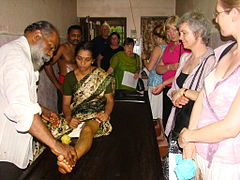Ayurveda, the ancient science of healing and well-being, has captivated the world with its holistic approach to health. Rooted in ancient Indian traditions, Ayurveda offers a comprehensive system of medicine and lifestyle practices that promote balance and harmony within the body, mind, and spirit. In this article, we delve into the depths of Ayurveda, exploring its origins, principles, treatments, and numerous benefits for overall wellness.
Introduction

In the world of holistic wellness, Ayurveda stands as a timeless gem, offering a comprehensive approach to health and well-being. With its roots in ancient Indian traditions, Ayurveda has captivated the attention of people worldwide, seeking a harmonious balance in their lives. The word “Ayurveda” is derived from Sanskrit, where “Ayur” means life, and “Veda” means knowledge or science. Thus, Ayurveda can be understood as the “science of life.”
Ayurveda encompasses a holistic understanding of the human body, mind, and spirit, emphasizing the interconnection between these aspects. It goes beyond the conventional approaches of modern medicine, delving into the realms of diet, lifestyle, exercise, meditation, herbal remedies, and spiritual practices. The goal of Ayurveda is to create harmony within oneself and with the surrounding environment, leading to optimal health and well-being.
The origins of Ayurveda can be traced back thousands of years to the ancient texts called the Vedas. These sacred scriptures contain a wealth of knowledge about various aspects of life, including medicine, spirituality, philosophy, and rituals. Ayurveda emerged from the Vedas as a comprehensive system of medicine, evolving and expanding over time through the contributions of scholars, physicians, and practitioners.
Ayurveda recognizes that each individual is unique, with their own specific constitution and characteristics. It classifies individuals into three primary doshas: Vata, Pitta, and Kapha. These doshas represent the fundamental forces or energies that govern various functions in the body. By understanding one’s dosha constitution, Ayurveda offers personalized recommendations for diet, lifestyle, treatments, and preventive measures.
One of the fundamental principles of Ayurveda is the belief that imbalances in the doshas lead to diseases and disharmony. The aim of Ayurvedic practices is to restore the balance of the doshas and promote optimal health. Ayurvedic treatments encompass a wide range of modalities, including herbal remedies, dietary modifications, detoxification practices, massage therapies, yoga, and meditation. These treatments are tailored to address the specific needs of an individual, focusing on the underlying causes rather than just the symptoms.
Ayurveda is not limited to the physical realm alone. It recognizes the intricate connection between the mind, body, and spirit, emphasizing the importance of mental and emotional well-being. Ayurvedic practices such as meditation, yoga, and mindfulness help cultivate a calm and balanced state of mind, promoting inner peace and clarity.
In recent years, Ayurveda has gained recognition and acceptance in the field of modern medicine. Researchers are exploring the effectiveness of Ayurvedic treatments for various health conditions, and integrative medicine approaches are being adopted to combine the best of both worlds.
In conclusion, Ayurveda offers a holistic approach to health and well-being, integrating ancient wisdom with modern knowledge. By embracing the principles of Ayurveda and incorporating its practices into our lives, we can embark on a transformative journey towards balance, harmony, and optimal well-being.
Principles of Ayurveda

Ayurveda is guided by a set of principles that form the foundation of its holistic approach to health and well-being. These principles focus on achieving balance and harmony within the body, mind, and spirit. By understanding and applying these principles, individuals can cultivate optimal health and live in harmony with themselves and their environment. Let’s explore these principles in more detail:
- Panchamahabhutas (Five Elements): Ayurveda recognizes that everything in the universe, including the human body, is composed of five elements – space (akash), air (vayu), fire (agni), water (jala), and earth (prithvi). These elements combine to form the three doshas (Vata, Pitta, and Kapha) and influence various physiological and psychological processes in the body.
- Tridosha Theory: According to Ayurveda, each individual has a unique constitution or prakriti, which is determined by the predominance of the three doshas: Vata, Pitta, and Kapha. The balance and interaction of these doshas determine an individual’s physical, mental, and emotional characteristics. Ayurveda seeks to understand the dosha constitution of an individual to provide personalized recommendations for diet, lifestyle, and treatments.
- Sapta Dhatus (Seven Tissues): Ayurveda recognizes that the human body is composed of seven primary tissues or dhatus – plasma (rasa), blood (rakta), muscle (mamsa), adipose tissue (meda), bone (asthi), bone marrow (majja), and reproductive tissues (shukra). These dhatus are interconnected, and imbalances in one can affect the others. Ayurveda focuses on maintaining the balance and nourishment of these tissues for optimal health.
- Agni (Digestive Fire): Agni, the digestive fire, plays a crucial role in Ayurveda. It represents the transformative power of digestion and metabolism. Ayurveda emphasizes the importance of maintaining a robust digestive fire to ensure proper digestion, absorption, and elimination of waste products. Various factors, such as diet, lifestyle, and emotional state, can influence the strength of agni.
- Malas (Waste Products): Ayurveda recognizes the importance of proper elimination to maintain good health. Malas refer to the waste products of the body, including urine, feces, and sweat. Ayurvedic practices aim to support the efficient elimination of malas to prevent the accumulation of toxins in the body.
- Prakriti and Vikriti: Prakriti refers to an individual’s natural constitution, determined by the doshas at the time of birth. Vikriti, on the other hand, refers to the current state of imbalance or disease. Ayurveda assesses both prakriti and vikriti to understand an individual’s unique needs and provide personalized recommendations for restoring balance and promoting well-being.
- Ritucharya (Seasonal Routine): Ayurveda recognizes the influence of seasons on our health and well-being. Ritucharya refers to the seasonal routines and practices that help us align with the natural rhythms of the environment. By adapting our diet, lifestyle, and self-care practices according to the seasons, we can support our overall health and prevent imbalances.
- Ahara (Food) and Aushadha (Herbs): Ayurveda emphasizes the importance of proper nutrition for maintaining health. It recognizes that food can be both nourishing and medicinal. Ayurvedic dietary principles guide individuals to choose foods that are suitable for their dosha constitution and support their specific needs. Additionally, Ayurveda
Ayurveda for Mental Health

Ayurveda recognizes the profound connection between the mind and body, highlighting the importance of mental well-being for overall health. It offers holistic practices and principles to support mental health and emotional balance. Here are some key aspects of Ayurveda for mental health:
- Mind-Body Connection: Ayurveda views the mind and body as interconnected and mutually influencing each other. Imbalances in the doshas or physical health can impact mental well-being, and vice versa. Ayurveda seeks to restore balance and harmony to both the mind and body for optimal mental health.
- Diet and Digestion: Ayurveda recognizes the impact of diet on mental health. A healthy digestive system is considered essential for the production of neurotransmitters and the absorption of nutrients that support brain function. Ayurvedic dietary principles aim to balance the doshas and provide nourishment to the mind through the consumption of fresh, whole foods and mindful eating practices.
- Stress Management: Ayurveda offers effective stress management techniques to promote mental well-being. Practices such as meditation, yoga, and pranayama (breathing exercises) help calm the mind, reduce stress, and improve resilience. Ayurvedic herbs like ashwagandha and brahmi are also known for their adaptogenic properties, helping the body adapt to stress and promoting emotional balance.
- Daily Routine (Dinacharya): Following a consistent daily routine is an essential aspect of Ayurveda for mental health. A well-planned routine that includes activities such as waking up early, practicing self-care, exercising, and incorporating periods of rest and relaxation helps create stability and supports a balanced mind.
- Ayurvedic Therapies: Ayurveda offers a range of therapeutic practices to enhance mental well-being. Panchakarma, a detoxification and rejuvenation therapy, helps eliminate physical and mental toxins. Shirodhara, a gentle pouring of warm oil on the forehead, promotes deep relaxation and calms the mind. Abhyanga, a full-body oil massage, can help reduce stress and anxiety.
- Herbal Remedies: Ayurvedic herbs and herbal formulations are used to support mental health and balance the doshas. Ashwagandha, Brahmi, Jatamansi, and Shankhapushpi are among the herbs known for their ability to promote relaxation, reduce anxiety, and support cognitive function. However, it is important to consult with an Ayurvedic practitioner before using any herbal remedies.
- Sattvic Lifestyle: Ayurveda encourages adopting a sattvic lifestyle for mental clarity and emotional balance. Sattva is a quality associated with purity, harmony, and peace. This involves cultivating positive thoughts, engaging in uplifting activities, practicing gratitude, and surrounding oneself with a supportive and positive environment.
- Self-awareness and Mindfulness: Ayurveda emphasizes self-awareness as a key aspect of mental health. Practicing mindfulness, observing one’s thoughts and emotions without judgment, can help cultivate self-awareness and develop a deeper understanding of one’s mental and emotional patterns. This awareness allows individuals to make conscious choices and take steps towards emotional balance.
Ayurveda offers a comprehensive approach to mental health, focusing on nurturing the mind, balancing the doshas, and promoting overall well-being. By integrating Ayurvedic practices into daily life, individuals can enhance their mental resilience, find emotional balance, and experience greater harmony between the mind, body, and spirit. However, it is important to seek guidance from a qualified Ayurvedic practitioner for a personalized approach to mental health.
Ayurveda and Holistic Wellness

Ayurveda, with its holistic approach, provides a comprehensive framework for achieving and maintaining overall wellness. It recognizes that true well-being encompasses not only physical health but also mental, emotional, and spiritual harmony. Here’s a closer look at how Ayurveda promotes holistic wellness:
- Balance of the Doshas: Ayurveda places great importance on balancing the three doshas (Vata, Pitta, and Kapha) as the foundation of well-being. When the doshas are in balance, the body functions optimally, and harmony is experienced at all levels. Ayurvedic practices aim to identify individual dosha imbalances and provide personalized recommendations to restore equilibrium.
- Individualized Approach: Ayurveda recognizes that each person is unique, with specific needs and imbalances. Therefore, it emphasizes personalized care and treatments. Ayurvedic practitioners assess an individual’s dosha constitution, current imbalances, lifestyle, and other factors to tailor recommendations for diet, lifestyle, herbal remedies, and therapies.
- Stress Reduction: Ayurveda acknowledges the impact of stress on overall wellness. Excessive stress can disrupt the doshas, compromise the immune system, and lead to various health issues. Ayurvedic practices such as meditation, yoga, breathing exercises, and relaxation techniques help manage stress, promote relaxation, and enhance overall well-being.
- Promoting Digestive Health: Ayurveda recognizes the significance of proper digestion and a healthy gut for holistic wellness. A strong digestive fire (agni) is essential for efficient nutrient absorption and elimination of toxins. Ayurvedic dietary guidelines, including mindful eating, food combining, and consuming digestion-enhancing spices, support optimal digestion and gut health.
- Lifestyle Routines: Ayurveda emphasizes the importance of daily and seasonal routines (dinacharya and ritucharya) for maintaining balance and wellness. Following a consistent routine that includes waking up and going to bed at regular times, practicing self-care, and engaging in suitable physical activities supports overall vitality and harmonizes the body-mind system.
- Herbal Remedies and Therapies: Ayurveda utilizes a wide range of herbs, herbal formulations, and therapeutic techniques to support holistic wellness. Ayurvedic herbs and formulations are carefully chosen to address specific imbalances and promote overall health. Ayurvedic therapies like Panchakarma detoxification, Ayurvedic massage (Abhyanga), and oil treatments (Shirodhara) provide deep rejuvenation and relaxation.
- Emotional Well-being: Ayurveda recognizes the impact of emotions on health and emphasizes the importance of emotional well-being. Practices such as self-reflection, mindfulness, cultivating positive relationships, and engaging in activities that bring joy and fulfillment contribute to emotional balance and overall wellness.
- Spiritual Connection: Ayurveda acknowledges the spiritual dimension of human existence and its influence on holistic wellness. Cultivating a sense of purpose, connecting with nature, practicing gratitude, and engaging in spiritual practices help nourish the soul and promote overall well-being.
By addressing physical, mental, emotional, and spiritual aspects, Ayurveda offers a holistic approach to wellness. It empowers individuals to take an active role in their health, make conscious choices, and create a balanced and harmonious life. Incorporating Ayurvedic principles and practices into daily life can lead to enhanced vitality, improved resilience, and a deep sense of well-being.
Ayurveda for Skin and Hair

Ayurveda offers a holistic approach to skincare and hair care, focusing on maintaining the health and natural beauty of the skin and hair. It recognizes that external appearance is closely linked to internal health and emphasizes the importance of balance in the doshas for healthy skin and lustrous hair. Here’s a closer look at Ayurveda’s approach to skin and hair care:
- Understanding Skin and Hair Types: Ayurveda recognizes that individuals have different skin and hair types based on their dosha constitution. The three doshas (Vata, Pitta, and Kapha) influence the qualities of the skin and hair. Understanding your unique skin and hair type allows you to choose appropriate Ayurvedic treatments and products.
- Internal Balance: Ayurveda believes that beautiful skin and healthy hair are a reflection of internal balance. Imbalances in the doshas can manifest as skin issues like dryness, oiliness, acne, or hair problems like hair loss or dullness. Ayurvedic practices aim to restore dosha balance through diet, lifestyle, and herbal remedies.
- Cleansing and Detoxification: Ayurveda emphasizes the importance of gentle cleansing to remove impurities and maintain skin and scalp health. Natural cleansers like herbal powders (such as chickpea flour or neem powder) or herbal pastes (like turmeric and sandalwood) are used for cleansing the skin. For the hair, herbal hair cleansers (like Shikakai or Reetha) are preferred over harsh chemical-based shampoos.
- Moisturization and Nourishment: Ayurveda promotes the use of natural ingredients to moisturize and nourish the skin and hair. Herbal oils, such as coconut oil, almond oil, or sesame oil, are commonly used for moisturizing the skin. They are also applied to the hair and scalp to improve hair texture and promote healthy growth.
- Ayurvedic Herbs and Formulations: Ayurveda utilizes a wide range of herbs and herbal formulations to address specific skin and hair concerns. For example, Neem is known for its antibacterial properties and is used to treat acne and skin infections. Aloe vera is used for its soothing and healing properties. Brahmi and Bhringraj are popular herbs for promoting hair growth and reducing hair fall.
- Dietary Considerations: Ayurveda emphasizes the role of diet in maintaining healthy skin and hair. Including a variety of fresh fruits, vegetables, whole grains, and healthy fats in your diet provides essential nutrients that support skin and hair health. Ayurvedic dietary guidelines also recommend avoiding excessive consumption of spicy, oily, and processed foods, which can aggravate the doshas and contribute to skin and hair problems.
- Stress Management: Ayurveda recognizes the impact of stress on skin and hair health. Excessive stress can lead to skin issues like acne, eczema, or premature aging, and hair problems like hair loss or dullness. Ayurvedic practices such as meditation, yoga, and breathing exercises help reduce stress and promote overall well-being, benefiting the skin and hair.
- External Care: Ayurveda encourages gentle and natural care for the skin and hair. This includes using natural cleansers, herbal masks, and homemade remedies tailored to individual needs. Ayurvedic practices like regular scalp massage (with herbal oils) and applying natural face packs (with herbs like turmeric, sandalwood, or rose) help nourish and rejuvenate the skin and hair.
By following Ayurvedic principles and practices for skin and hair care, individuals can enhance the health and natural beauty of their skin and hair. Ayurveda’s holistic approach ensures that the treatments and remedies focus not only on external appearance but also on internal balance and overall well-being. It is advisable to consult with an Ayurvedic practitioner for personalized recommendations based on your specific skin and hair concerns.
Conclusion

Ayurveda, an ancient system of medicine, offers a holistic approach to health and well-being. Its principles and practices are rooted in the belief that balance and harmony in the body, mind, and spirit are essential for overall wellness. Throughout this article, we have explored various aspects of Ayurveda and its applications in different areas.
We began by introducing Ayurveda and its origins, highlighting its focus on individualized care and the concept of doshas. We then delved into the principles of Ayurveda, emphasizing the importance of balance and the interconnectedness of the mind and body. Ayurveda’s emphasis on diet and lifestyle as a foundation for health was discussed, along with its guidelines for maintaining optimal well-being.
The article then explored Ayurveda’s role in mental health, highlighting the mind-body connection and the significance of stress management, self-awareness, and holistic therapies. We also discussed how Ayurveda promotes mental well-being through dietary recommendations, herbal remedies, and sattvic lifestyle practices.
In the section on Ayurveda and holistic wellness, we explored how Ayurveda takes a comprehensive approach to well-being by considering all aspects of an individual’s life. From balancing the doshas to managing stress, adopting daily routines, and incorporating herbal remedies and therapies, Ayurveda aims to support overall vitality and harmony.
We then focused on Ayurveda for skin and hair, discussing the importance of understanding one’s unique constitution, using natural cleansers and moisturizers, and incorporating Ayurvedic herbs and formulations for specific concerns. The role of diet, stress management, and external care practices were also highlighted.
In conclusion, Ayurveda offers a profound understanding of health and well-being by considering the individual as a whole. Its principles and practices provide guidance for achieving balance, nourishing the mind and body, and cultivating overall wellness. By embracing Ayurveda’s holistic approach, individuals can enhance their physical, mental, and emotional well-being, leading to a more harmonious and fulfilling life.



In line with my study, after a foreclosed home is bought at a sale, it is common for your borrower in order to still have any remaining unpaid debt on the mortgage. There are many financial institutions who attempt to have all expenses and liens repaid by the upcoming buyer. However, depending on particular programs, regulations, and state laws and regulations there may be some loans that are not easily resolved through the shift of loans. Therefore, the obligation still falls on the lender that has received his or her property in foreclosure. Thank you for sharing your thinking on this blog site.
As I site possessor I believe the content material here is rattling excellent , appreciate it for your efforts. You should keep it up forever! Best of luck.
Simply desire to say your article is as astonishing. The clarity in your post is simply great and i can assume you’re an expert on this subject. Well with your permission allow me to grab your feed to keep up to date with forthcoming post. Thanks a million and please continue the enjoyable work.